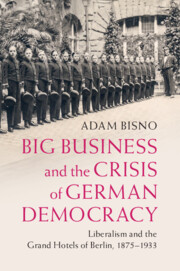Acknowledgments
Thank you to my parents, Alison Peck and Edward Bisno, and my sister Amy Bisno and brother-in-law Jaimie Grant. They made this possible. Thank you to my friends: Elisabeth Boulos, who got me into this business; Susan Corbesero and Brooke McLane Higginson, who listened to my arguments and helped free me from the sticky parts; Nicholas Phillips, who helped me turn a better, clearer phrase; Dominic Sefton and Carla Heelan, who believe in me; Roland Justen, Kathryn Justen, Brigid von Preussen, and Angelika Hoelger, who made Germany such a nice place for me to be; Lekha Shupeck and Nandini Pandey for sticking around and giving me confidence; and Alex Bush, for the years of laughs and last-minute advice on translations.
I thank the organizations and people at those organizations who have supported me. The German Historical Institute, Washington, DC, has been my home a block away from home. My editor there, Kelly McCullough, gave crucial words of encouragement and secured me a nice place to finish the typescript. Axel Jansen and Atiba Pertilla helped make that happen, too, as we all tried to figure out access to scholarly literature and workspace during a pandemic. In the library, Anna Maria Boss sourced the hard-to-find volumes. Bénédicte Pillot-Bechtold made me feel welcome. The fellows and other guest scholars accompanied me through the lonely stages of revision. Simone Lässig shared valuable materials with me from her research into some of the Jewish businessmen at the center of this book’s story. David Lazar read that story early on and assured me that it was a good one. Liz Friend-Smith at Cambridge University Press shepherded the typescript through review, editing, production, and publication. Elizabeth Tucker helped me polish the prose.
Before all that, at Johns Hopkins University, where the project started, my advisor Peter Jelavich, the Doktorvater who wants only the best for you and always takes you seriously, extended me care and guidance, backing my work in its more awkward phases. My dissertation committee, Katie Hindmarch-Watson, Douglas Mao, Katrin Pahl, and Ronald Walters offered insights and suggestions during my defense that helped me refine the arguments below. Graduate student colleagues Will Brown, Jessica Clark, Christopher Consolino, Katie Hemphill, and Ren Pepitone provided ideas and moral support. Outside Hopkins, I relied on the generosity of the Berlin Program for Advanced German and European Studies.
Finally, I thank Henryetta and Sam Peck, my great-grandparents. (I carry Sam’s name as my middle name.) From the 1930s to the 1970s, they owned and operated a hotel in Little Rock, Arkansas, where my grandfather, my mother, and her siblings grew up. Their stories about “the hotel” fascinate me and must have had something to do with my choice of topic. I cannot claim to understand hoteliers any better for having them as my ancestors, but I see now that this book is part of their legacy.
I knew my great-grandmother, Henryetta, personally. Like everyone else, I called her by her nickname, Ana, the German pronunciation of Anne. Her parents had descended from Berliners who came to this country in the first wave of German-Jewish immigration to the United States, just after the Revolutions of 1848. Henryetta was elegant, charming, funny, eccentric, and organized – everything a hotelier is supposed to be. This book is about a different sort of hotelier, a different kind of hotel, and a different time and place. It’s about businessmen, big business, and the collapse of German urban society in the first part of the twentieth century.
And yet this book offers a tale that might just have resonated with my great-grandmother and her heir, my grandfather: How do you make sense of your hotel’s final days? It is the 1970s in Little Rock, downtown is in decline, speculators are buying up what has yet to collapse, and the hotel can’t do business as usual. You sell it. Decades pass as the building changes hands several times and finally settles into disuse. In the end, all that remains of the family business, the Hotel Sam Peck, our legacy, are matchbooks, postcards, a few photographs, and a little correspondence. What are we supposed to do now? My answer has been this book.

